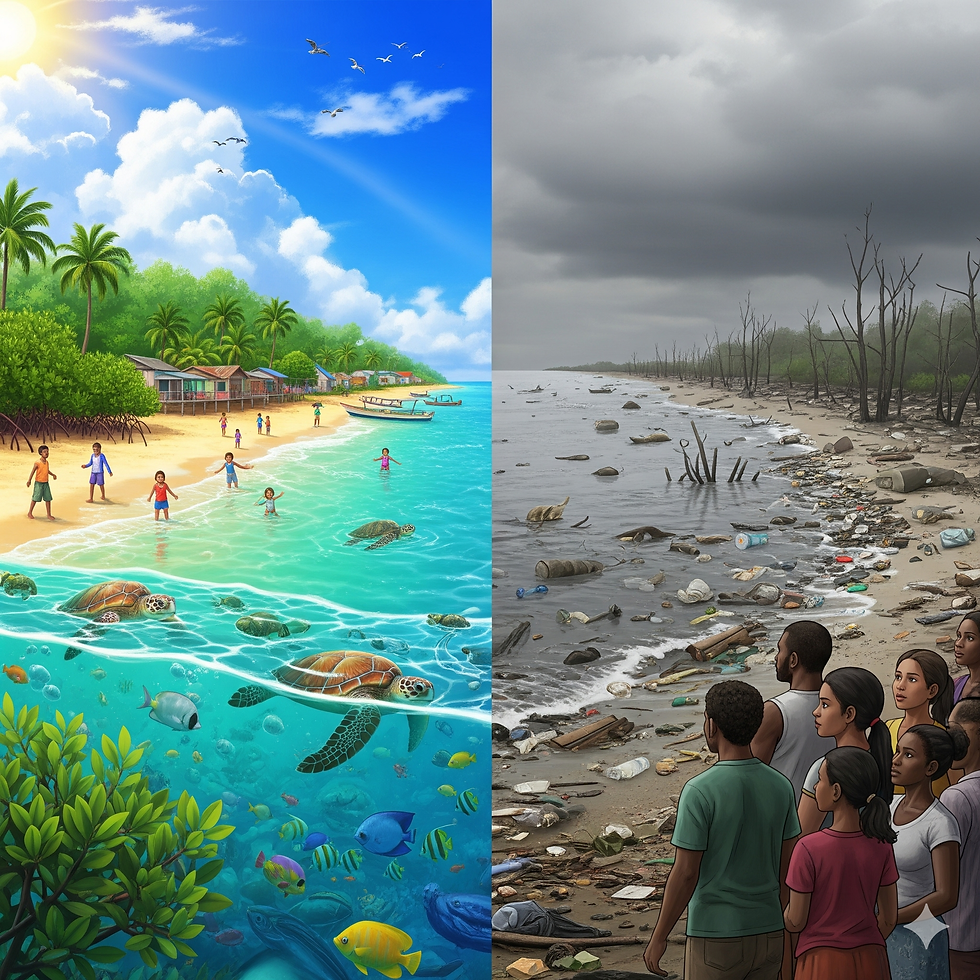An Honest Look at Sea Turtle Conservation
- eve
- Sep 1, 2025
- 3 min read

What do you see when you envision the future for yourself and the next generation? Bright and vibrant, right? Think the opposite and imagine a future worse than your present. Now imagine it is your fault that the future is dull and hopeless.
This was the approach we took recently while conducting a turtle protection sensitization meeting with the community in Kipungani, as part of our Turtle Protection Program in partnership with Tusk Trust and Lamu Environment Foundation (LEF). It was both impressive and unsettling what they had to say about sea turtles.
Importance of Sea Turtles in Kipungani
We encountered an honest community; one that let us know the importance of turtles to them:
It is a tourist attraction that generates revenue when they take visitors snorkelling
It has created job opportunities for the turtle rangers
Their oil is medicinal especially for pumu - asthma
It is a source of meat and decorative skin
Turtles clean the sea by consuming jellyfish
But as Mohamed, our Megafauna lead pointed out, you have to choose your poison. If you are sick, and turtle oil is one of the cures, you have the choice to use it. However, knowing very well that there are other sources of cure to your ailment, why would you still kill that turtle?
Do you know that by choosing to kill turtles for medicine, you have chosen your poison? You have contributed to their impending extinction and in turn, an imbalance in the marine ecosystem. You have posed a threat to your own life in the near future, and the generation to come: who may not enjoy some key benefits of sea turtles mentioned above. Is that better than finding other sources of cure or meat to save sea turtles? You have chosen the tasty poison; one that is more lethal.

It was at this juncture that the room had mixed feelings; especially because many of them argued that they don’t kill turtles, leave alone obtaining meat, skin and oil. Jackline, our fisheries data officer pointed out that there are more ways in which they could contribute directly to sea turtle extinction.
Anthropogenic Threats to Sea Turtles
Besides climate change and turtle eggs predators, sea turtles are facing extinction because of the following reasons directly linked to human activities;
Poaching eggs for consumption, and the adult turtles for their skin, fat, internal organs and blood.
Urbanization at the beach destroys their nesting habitats and the night-time light disorients them when trying to lay eggs, increasing their vulnerability to predators.
Plastic pollution - sea turtles eat jellyfish, which look a lot like plastic when underwater. There is no way a turtle would tell the difference, hence they end up eating plastic which is indigestible, causing internal injuries, intestinal blockages and starvation.
Overfishing - degrades the integrity of corals which are their habitats and depletes fish populations, disrupting the marine food web and the availability of food sources for sea turtles.
Illegal fishing gear that trap bycatch turtles indefinitely - some end up severely injured, starved or drowned.
Sea Turtle Conservation Measures

While making poetic comparisons of our body organs to the importance of sea turtles in the ocean, our fisheries lead Mr. Komu went on to encourage the community on how they can contribute positively towards conserving these animals.
Fish sustainably, while being mindful of the corals which are the natural habitats of fish and turtles.
Use appropriate fishing gear and release bycatch turtles back to sea. In conjunction with Peponi Hotel, we encourage fishers to bring us the bycatch turtles for tagging and release after a checkup.
Say no to single-use plastic and dispose of them appropriately.
Avoid dumping any waste into the ocean; including oil.
Use alternative medicine in place of turtle oil; one of which is the Habatsauda, an oil believed in Islam to be cure for many ailments simultaneously.

Raabia Hawa from LEF concluded the session by encouraging the community to be vigilant in conserving the ocean and all fauna and flora in it; it is our calling to do so as humans. The session ended on a high note; with Raabiah mentioning clearly that under Kenyan law it is illegal to even think about harming a sea turtle.
The penalty for killing sea turtles is a fine of KES 20 million or life imprisonment or both.
Written by Evelyn Kimori

















Comments